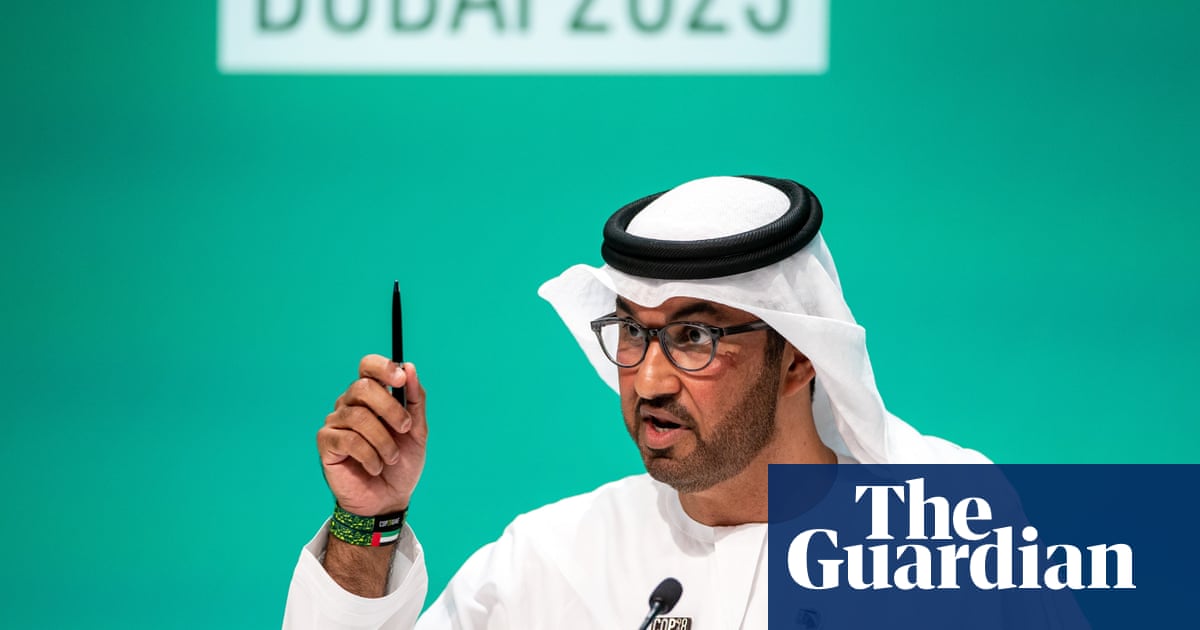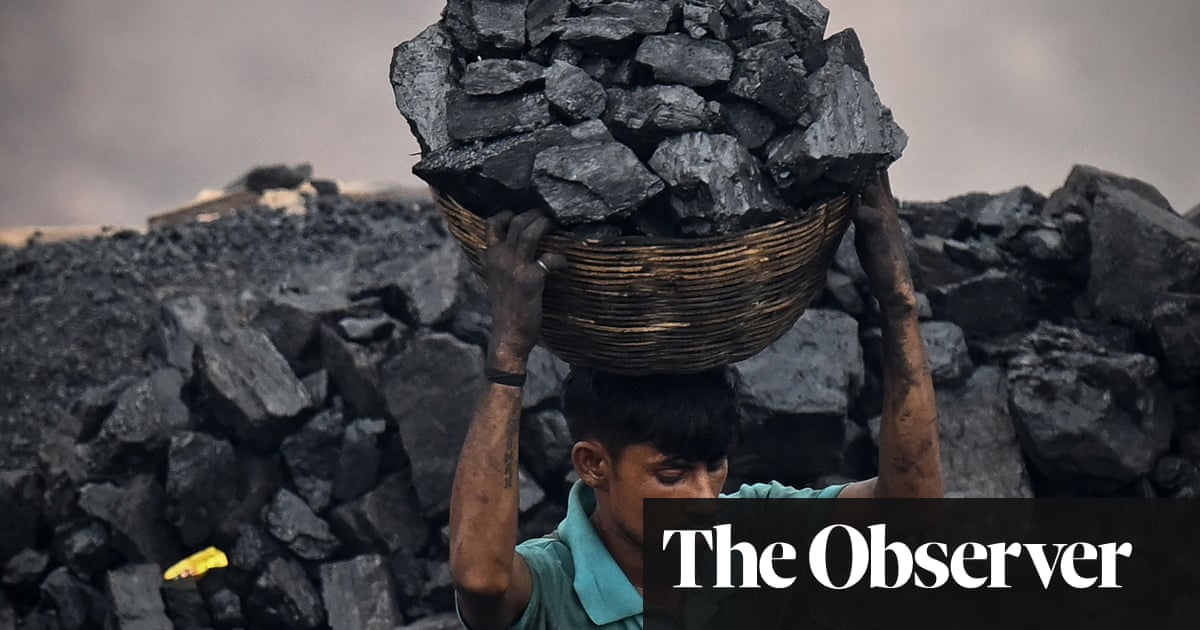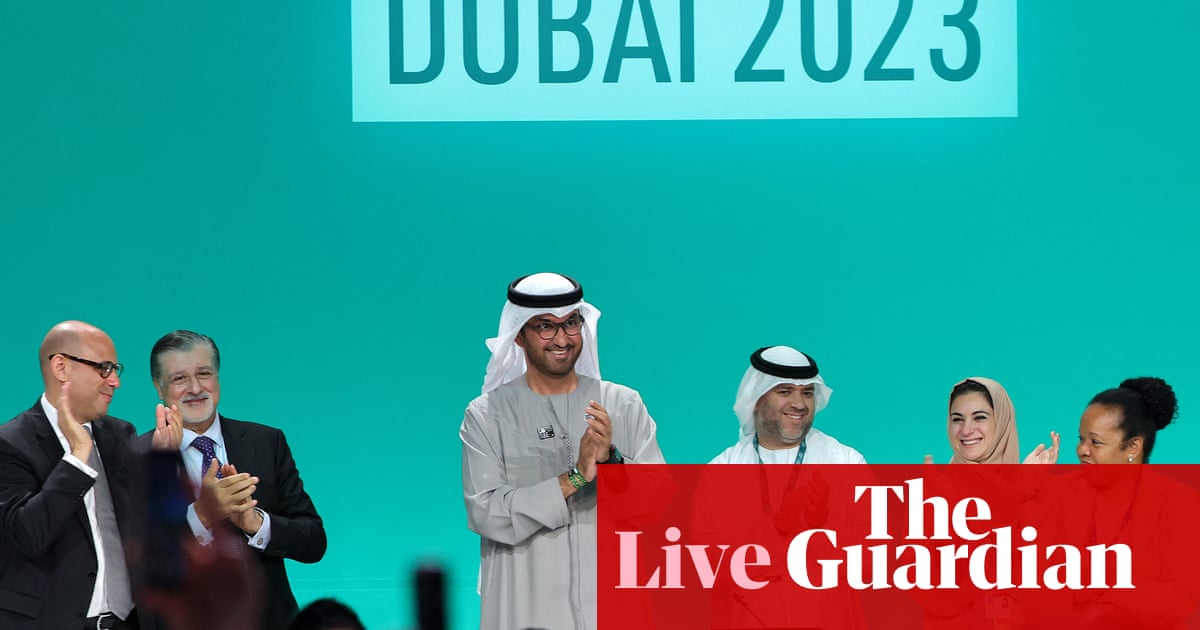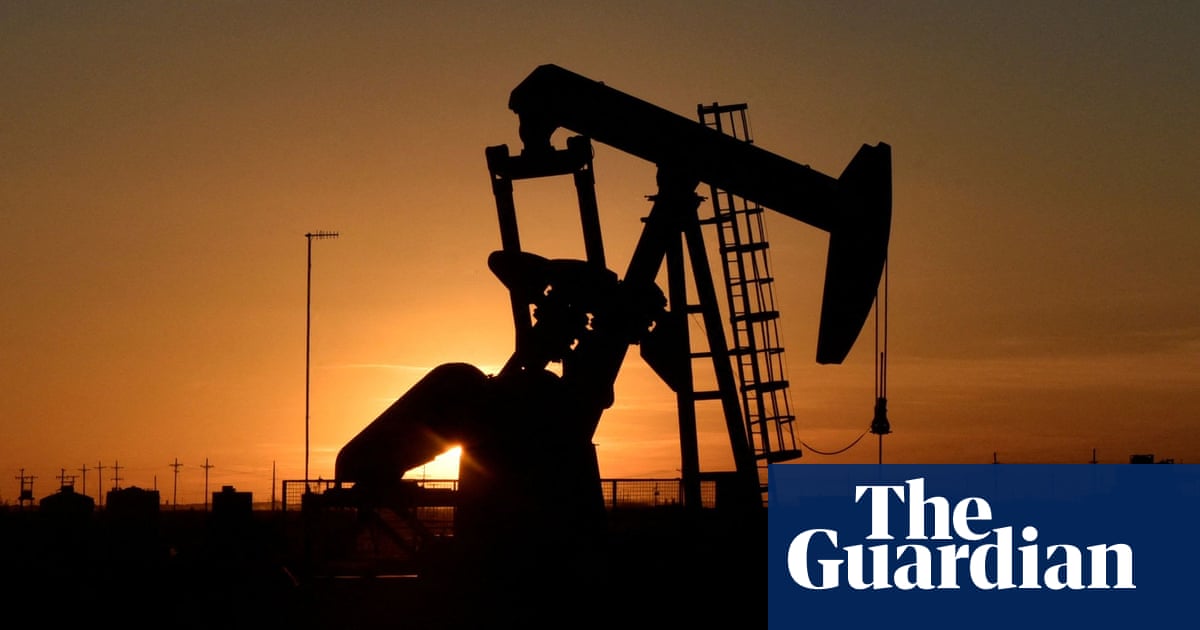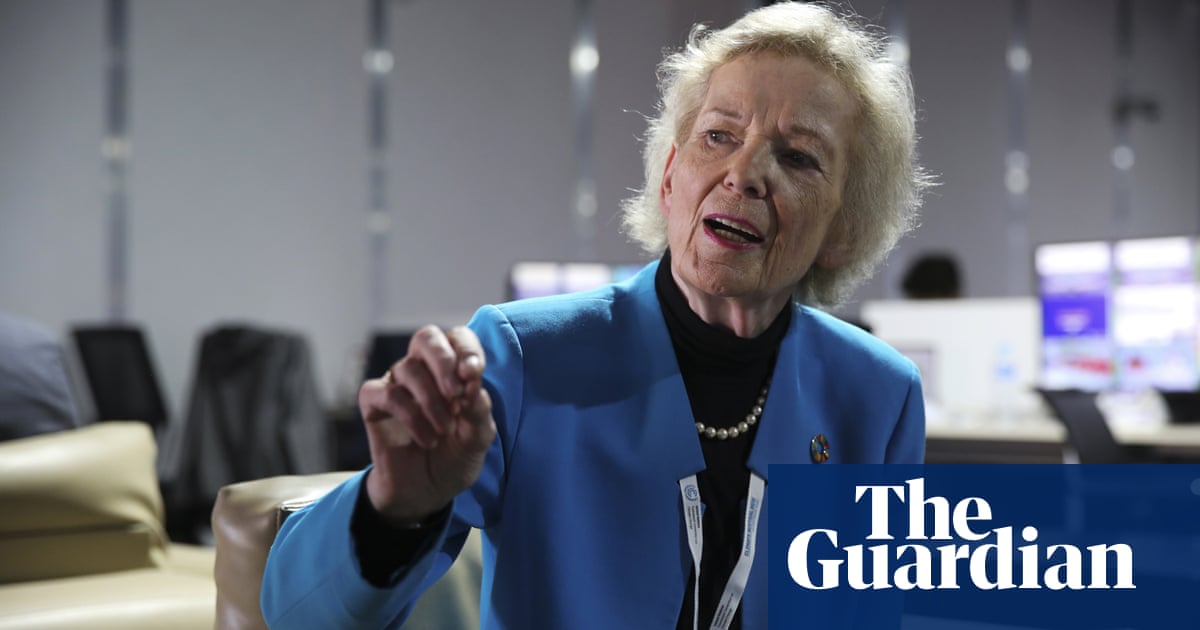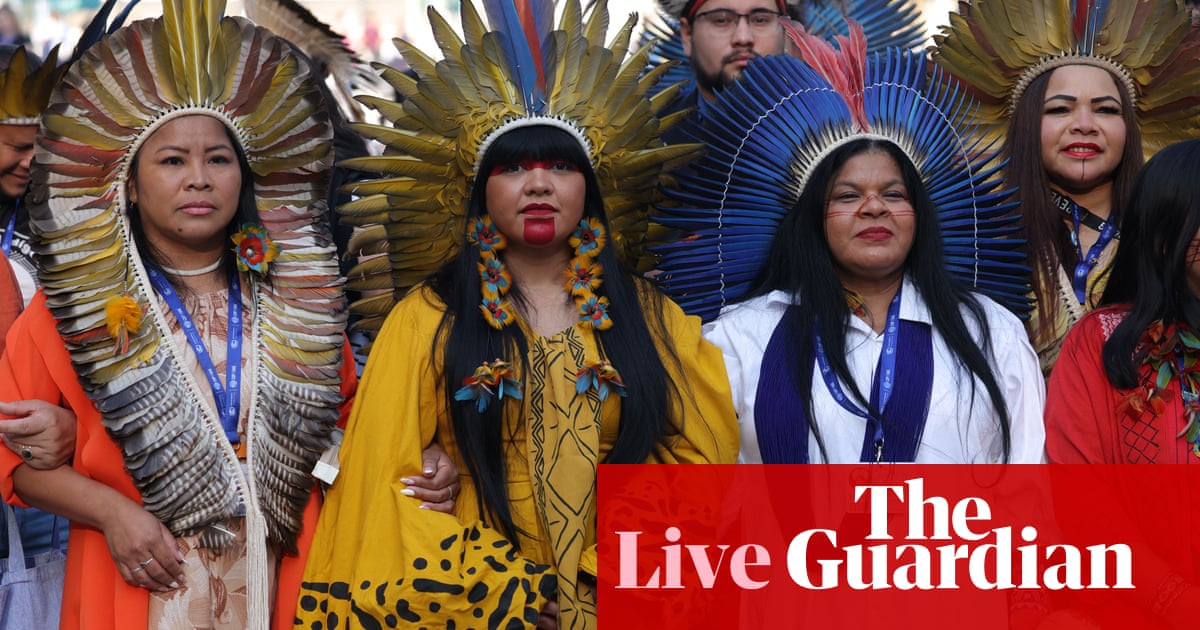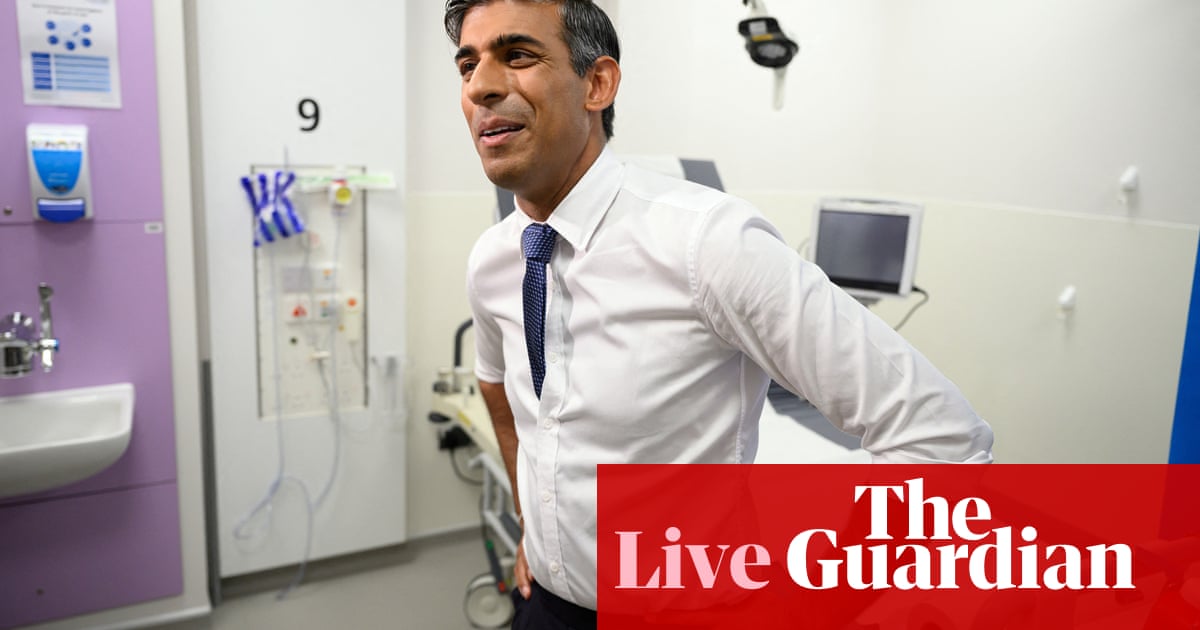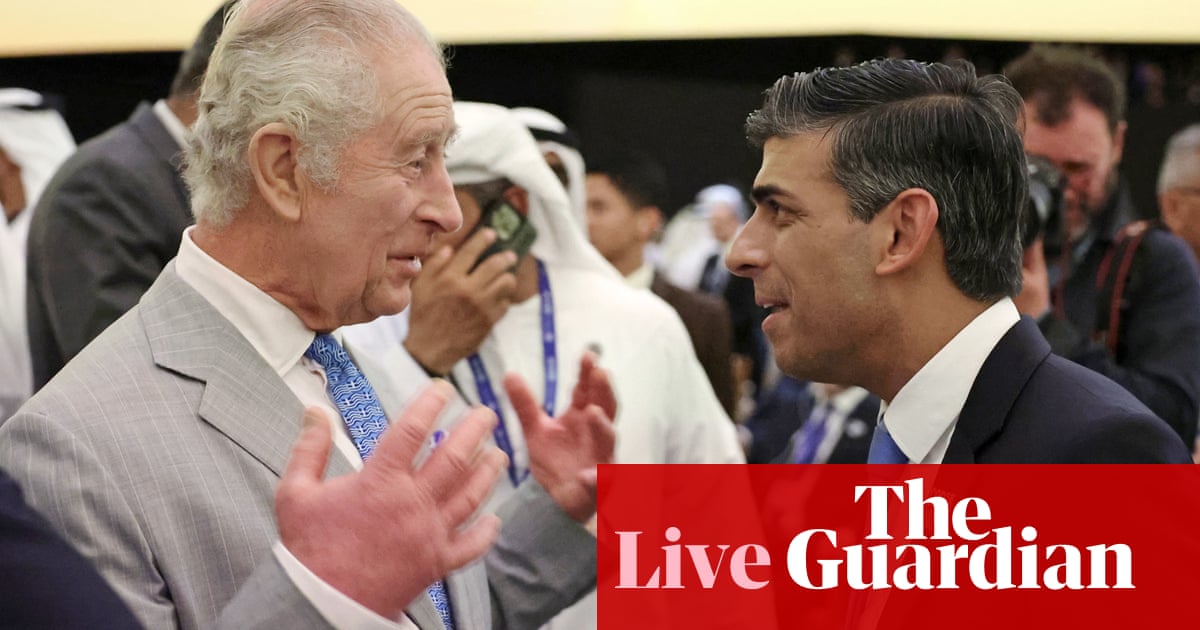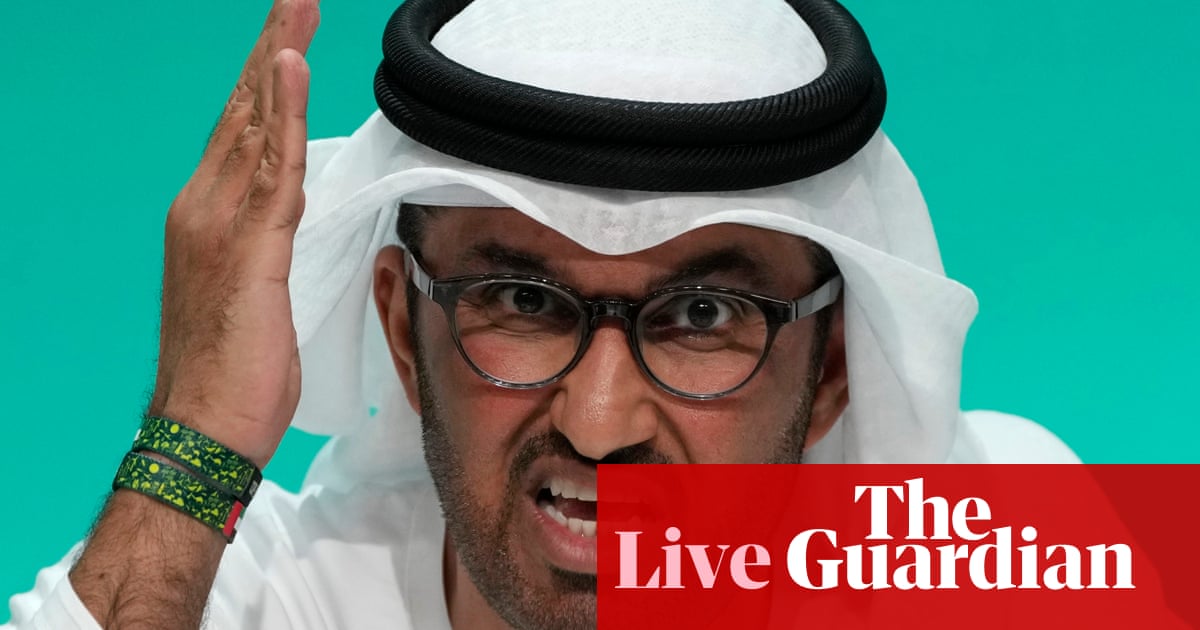
Al Jaber says comments claiming there is ‘no science’ behind demands for phase-out of fossil fuels were "misinterpreted"
The Cop28 president and oil chief gave an extraordinary response to a question from a reporter from the Sydney Morning Herald who directly addressed the Guardian report. He claimed he had been misrepresented and gave an impassioned defence of his background and belief in the science.
Al Jaber said he had “incredible respect for Mary Robinson” after he was accused of being arrogant towards the former Irish president when he said there was no scientific need to phase out fossil fuels, adding: “I was very honoured to receive her invitation to speak in a discussion around climate and gender.”
Then he came on to the media reports of his comments (which are in this blog on camera at 08.57):
“Let’s just clarify where I stand on the science … I honestly think there is some confusion out there and misrepresentation. Let me first introduce myself to you. I’m an engineer by background. It’s the science and my respect for the science and my conviction for the science and the passion for the science that have allowed me to progress in my career.”
Said he has supplemented this with “business and economic skills” to progress in his career.
He added:“The phase-down and the phase-out of fossil fuels … is essential. It needs to be orderly, fair, just and responsible.”
Al Jaber accused those who reported his comments on phasing out fossil fuels of “undermining” his message: “Allow me to say that I am quite surprised at the constant attempt to undermine this message.”
Summary
Wrapping up another day of Cop28 in Dubai, the main event was Sultan Al Jaber, the summit president, calling a surprise press conference.
He called the presser after the Guardian reported he had said a phase-out of fossil fuels would not allow sustainable development “unless you want to take the world back into caves”.
Al Jaber gave a fierce defence of himself, claiming his comments had been “misinterpreted”. He defended his record, and said he believes in the science and that Cop28 has been very successful so far.
All eyes will now be on Al Jaber over the coming days to see if he can fulfil his pledge that an “unprecedented outcome” to keep alive hopes of limiting global temperature rises to 1.5C, is within reach.
In other developments:
Water Aid called for rich countries to do more to meet this year’s target of $300m for the climate adaptation fund.
More than 1000 climate scientists called for mass collective action to avert climate breakdown.
Representatives of small island states said they would continue to demand a phaseout of fossil fuels – and hold Sultan Al Jaber to account for this.
Scientists urge public to take collective action to stop climate breakdown
Nearly 1500 scientists, who include authors of Intergovernmental Panel on Climate Change reports on the climate crisis, have signed an open letter calling on the public to take collective action to avert climate breakdown.
“We are terrified,” they warn. “We need you.”
“Wherever you are, become a climate advocate or activist,” the letter, published on Monday by Scientist Rebellion says.
They published the letter as delegates of world leaders at COP28 in Dubai have yet to come to any agreement on the idea that fossil fuels should be either “phased out” or “phased down” as the UN climate conference continues. Remarkably no COP has ever managed to produce a global agreement on either a phase out or down of fossil fuels.
Fossil fuel lobbyists are in force at the conference, and the chair Sultan Al Jaber, who is also head of the UAE national oil company, Adnoc, is under fire over comments revealed in The Guardian claiming there is no science behind demands for a phase out of fossil fuels.
In frustration at the lack of action by Governments, the scientists are calling for a large-scale mobilisation of society to tackle the entrenched power of the fossil fuel industry, its lobbyists and politicians.
Our dedicated fashion followers may have noticed some colour coordination among the civil society participants, particularly the veteran climate justice advocates. Sunday was white for human rights and solidarity with Palestine, today yellow for climate finance, which might explain why this morning’s protest features special guest Pickachu. This was no last minute wardrobe planning – turns out the climate justice movement has a daily colour code, an idea borrowed from the feminist movement.
“The colours are underlining the boldness but also joy of our feminists’ demands for a just and livable future that was joined this year by civil society and Indigenous peoples in solidarity. It goes back to 2015 when feminists in the UN space for SDGs came up with it for the first time”, said Pat Bohland, from the Women and Gender Constituency Facilitative Committee.
Tuesday is orange for phase out fossil fuels and Wednesday is blue for loss and damage.
Water Aid has condemned the failure of richer countries to meet pledges of money for the climate adaptation fund. Only $155m has been raised for the climate adaptation fund this year, a huge shortfall from the target the fund set itself for this year of $300m.
Claire Seaward, global campaigns director for WaterAid said: “We’re hugely disappointed that by the end of the finance day, we’ve not seen rich countries respond with the urgent adaptation financing required.
“Rich governments must double the public adaptation commitments … Until we see significantly more funding flowing down to vulnerable communities, we will keep demanding more urgent action.”
Keir Starmer: Sunak has broken UK political consensus on climate change
The UK will come back strongly to the world stage to “lead from the front” in tackling the climate crisis under a Labour government, UK opposition leader Keir Starmer has pledged, after meeting world leaders at the Cop28 summit in Dubai.
“There’s an overwhelming feeling here among world leaders that they want to see the UK back playing a leading role,” he told the Guardian at the UN climate talks. “That’s why our statement of intent that under a Labour government we will be back playing a leading role has been really well received.
“And when we say leading on this, we mean leading by the power of example.”
He also accused prime minister Rishi Sunak of breaking the UK’s longstanding cross-party consensus on the climate crisis. “We want to restore that cross-party consensus, but the way we will do it is by leading from the front,” said Starmer. “Those that want to be with us on this journey are very welcome. And I know there are leading lights in other political parties who would welcome an incoming Labour government leading from the front.”
Read more below.
Coventry University’s vice-chancellor has spoken on how young people can make a real difference at Cop28.
Professor John Latham CBE spoke at an event designed to promote actions and solutions through education. It was attended by students and higher education representatives from across the world.
Prof Latham said: “Cop28 is a remarkable milestone and I believe that the climate conversation is not only for politicians, academics or policy specialists; it is for everyone because it concerns everyone.”
Fatou Ndoye is a Senegalese climate expert who coordinates mangrove restoration in the west African country. She oversees a network of more than 30,000 fisherwomen in Senegal that are worth 900m euros to the economy and vital to the nation’s food supply.
Ndoye was the 2016 winner of the Gender Just Climate solutions awards. Previous winners are invited to Cops to provide input on negotiations and
Ndoye is a strong entry in our best-dressed series for Cop28.
Al Jaber says that science has guided his strategy as Cop28 president
The president of Cop28 has been forced into a fierce defence of his respect for climate science, following the Guardian’s revelation of his comment that there was “no science out there, or no scenario out there, that says that the phase-out of fossil fuel is what’s going to achieve 1.5C”.
At a hastily arranged press conference at the summit in Dubai, Sultan Al Jaber, who is also CEO of the UAE’s state oil company, Adnoc, said: “I respect the science in everything I do. I have repeatedly said that it is the science that has guided the principles or strategy as Cop28 president.”
“We have always built everything, every step of the way, on the science, on the facts,” he said.
Al Jaber made the controversial comments in ill-tempered responses to former UN climate envoy Mary Robinson during an online event on 21 November. During the exchange, he also said: “Show me the roadmap for a phase-out of fossil fuel that will allow for sustainable socioeconomic development, unless you want to take the world back into caves.”
Despite being at war with Russia, Ukraine has signed a deal at Cop28 with Danish renewable energy company Vestas to supply turbines to build in the country.
They agreed to build 64 wind turbines (of 6 MW each) with a total capacity of 384 MW. The first stage of the windfarm with a capacity of 114 MW was commissioned in the spring of 2023. Combined, the first and second phases of DTEK Tyligulska windfarm will have a capacity of around 500 MW (83 wind turbines).
900,000 households worth of electricity will be generated annually by the plant, and estimates suggest the project will save 1.7m tons of Co2.
The country has found onshore wind turbines to be a resilient form of energy during the war and is attempting to expand its capacity so the country can be reliably powered during the conflict.
Meanwhile, only two onshore wind turbines were built in England last year and no new projects have been planned.
As Al Jaber defends his position on the main stage at Cop, my colleague Nina Lakhani finds that away from the headlines there are lively discussions on other ideas.
We do try and make time for folks off the beaten Cop path, and today’s side event on crop diversity – an issue close to my heart – was a good reminder on why traditional knowledge and solutions need to be given more attention and resources.
“Crop diversity can help us reduce greenhouse gas emissions in agriculture, adapt to drought and promote healthy diets and sustainable livelihoods. There is no food security without it but we’re losing diversity from the fields and too many seed banks are inadequately resourced, ” said Stefan Schmitz, director of the Crop Trust.
Industrial agriculture dominated by monocrops, synthetic fertilisers, deforestation and conglomerates has devastated naturally occurring crop diversity in the past 60 years or so, and the race is now on to breed drought resistant and more weather-flexible crops. In the UAE for example, there are wild dates and olive trees adapted to extreme mountain conditions which could provide a “genetic treasure trove”, according to the World Wildlife Fund, which is trying to locate and conserve the heritage seeds for future generations. “Mankind created and has survived on the basis of crop diversity, it is part of our cultural heritage and nature. But there’s no sustainability climate funding available for protecting diversity, it goes to the food industry and 21st innovations, not traditional solutions,” added Schmitz.
Summary so far
What a busy day so far at Cop28. Obviously the main story was the surprise press conference held by Sultan Al Jaber, who was giving a response to Damian Carrington’s scoop on his comments questioning the science between fossil fuel phase-out.
I am handing over to my colleague Sandra Laville but before I do so, I’ll run you through the highlights. Stay tuned as this story continues to unfold – it will likely remain an explosive day at the summit.
Sultan Al Jaber, the Cop28 president, called a shock press conference after the Guardian reported he said a phase-out of fossil fuels would not allow sustainable development “unless you want to take the world back into caves”. In the conference he claimed this comments were “misinterpreted” and defended his record, said he believes in the science and that Cop28 has been very successful so far. He seemed genuinely rattled and kept repeating that he believes in the science. Damian, who broke the story, had a front row seat.
Cop director general, the ambassador Majid Al Suwaidi, also had to defend Al Jaber’s remarks, and implied that those who reported them were “undermining” the conference.
Representatives of small island states said they will continue to demand for a phaseout of fossil fuels – and hold Sultan Al Jaber to account for this.
Barbados’s prime minister, Mia Mottley, gave a press conference regarding international financial systems, where she said: “We are living in the age of superlatives. Temperature and extreme weather records are tumbling, and our finance systems cannot cope”.
In an exclusive interview with the Guardian, former US vice-president Al Gore said an agreement by countries to phase out fossil fuels would be “one of the most significant events in the history of humanity”. He added that it is “absurd” to put a fossil fuel company CEO in charge of Cop28.
A new report by CARE International UK found that women’s rights organisations are being shut out of climate finance.
Al Jaber says comments claiming there is ‘no science’ behind demands for phase-out of fossil fuels were "misinterpreted"
The Cop28 president and oil chief gave an extraordinary response to a question from a reporter from the Sydney Morning Herald who directly addressed the Guardian report. He claimed he had been misrepresented and gave an impassioned defence of his background and belief in the science.
Al Jaber said he had “incredible respect for Mary Robinson” after he was accused of being arrogant towards the former Irish president when he said there was no scientific need to phase out fossil fuels, adding: “I was very honoured to receive her invitation to speak in a discussion around climate and gender.”
Then he came on to the media reports of his comments (which are in this blog on camera at 08.57):
“Let’s just clarify where I stand on the science … I honestly think there is some confusion out there and misrepresentation. Let me first introduce myself to you. I’m an engineer by background. It’s the science and my respect for the science and my conviction for the science and the passion for the science that have allowed me to progress in my career.”
Said he has supplemented this with “business and economic skills” to progress in his career.
He added:“The phase-down and the phase-out of fossil fuels … is essential. It needs to be orderly, fair, just and responsible.”
Al Jaber accused those who reported his comments on phasing out fossil fuels of “undermining” his message: “Allow me to say that I am quite surprised at the constant attempt to undermine this message.”
Al Jaber is continuing his press conference, defending his record as Cop28 president after it was called into question following his questioning of the science behind phasing out fossil fuels.
He said his Cop had so far been very successful, pointing out the “breakthrough agreement on loss and damage” he said he has been “repeatedly saying” that he “made a promise” to make it happen and start filling an “empty bank account”. Of the loss and damage agreement he said:
“Again, that’s the first time in any Cop, on day one, that such a decision gets appointed. This is historic, these are success stories, no one can deny those.”
He also said that the conference has “tackled methane” for the first time and he has made it one of his “top priorities”.
The Cop28 president has also drawn attention to the tens of billions pledged by countries in the first four days of the summit.
Al Jaber said he has a “genuine and sincere intent to take that responsibility and attempt to translate all this great progress into real actions”.
Al Jaber tries to reset his image after Guardian scoop
Sultan Al Jaber is holding a surprise press conference right now following Damian Carrington’s scoop on his comments which have rocked the summit.
He has insisted that he respects the science after he said that a phaseout of fossil fuels was not scientifically necessary to to reach a cut of 1.5C.
“Let’s remember why we are all here. We are all here because we made a very clear call to action and we’ve been very upfront about it and we said clearly and repeatedly that the UAE takes this task with humility, responsibility and we fully understand the urgency behind this matter.
“We are here because we very much believe and respect the science. 43% of global emissions must be reduced by 2030.”
He added that “everything has been focused around and centred around the science”, repeating he has been “crystal clear on that”.





